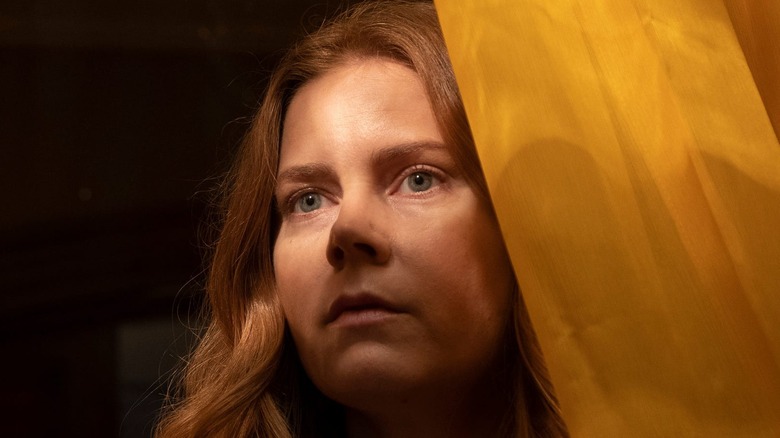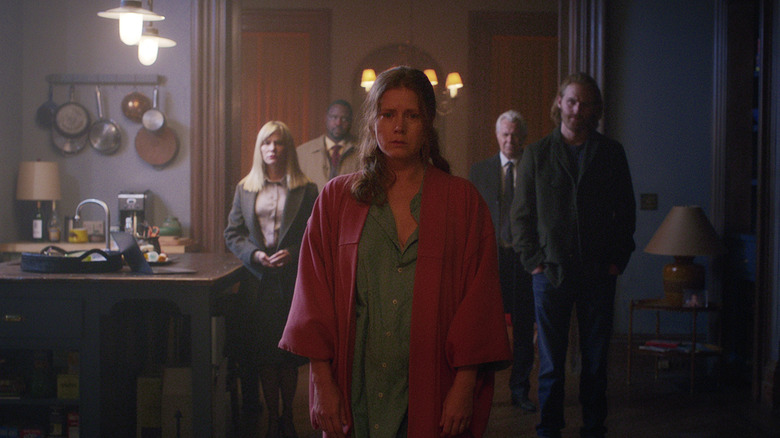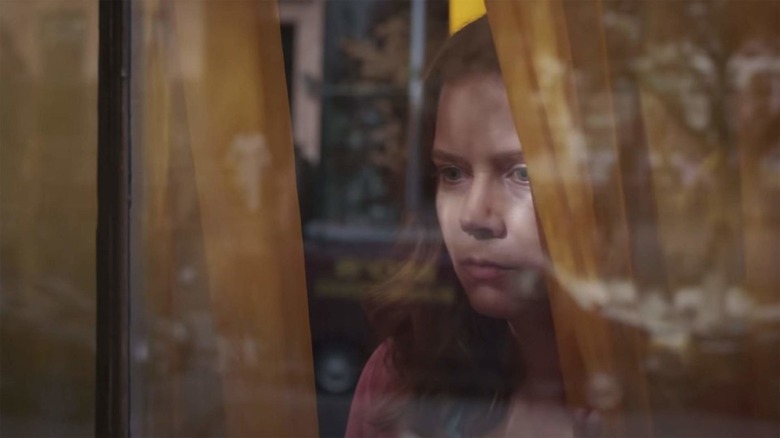The Woman In The Window Review: Reflections Of Better Thrillers
While recovering from a traumatic experience, a New York City resident becomes increasingly obsessed with their neighbors' behavior, hiding behind the curtains to watch everything that takes place. One day, they witness a gruesome incident across the street, and soon get invested in resolving a crime that nobody else believes happens. Yes, Alfred Hitchcock's "Rear Window" is one of the master of suspense's greatest thrillers, boasting a simple but ingenious premise that's often been stolen but never bettered — to this day, the classic "Simpsons" episode "Bart of Darkness" remains the only homage that can even hold a candle to the original.
The much-delayed "The Woman in the Window" is the latest film to take on this narrative; it may be adapted from a New York Times bestseller, but on the big screen, it can't help but feel like a conscious updating of an old Hollywood masterpiece. Director Joe Wright's adaptation does offer far more twists than the Hitchcock classic, but it's no secret that this film is designed solely for the audiences who haven't yet caught up with it, often feeling like a handsomely executed carbon copy with more iPhones and references to LinkedIn. It feels less derivative than it has any right to, but that doesn't necessarily mean it ever manages to shake off the weight of its clearest influence.
A troubled production - but you'd never know by watching it
After a life-altering accident, psychologist Anna Fox (Amy Adams) has developed agoraphobia. Newly separated from her husband (Anthony Mackie), she now has nobody she's close to, only a frosty relationship with her downstairs tenant (Wyatt Russell), choosing to spend most of her time taking comfort in old noir movies and spying on her new neighbors across the street, drinking more than is advised to go with her medication. The new arrivals are the Russells, who come directly into her life after their teenage son Ethan (Fred Hechinger) visits to confide in her about his unhappy home life. She soon meets Ethan's mother Jane (Julianne Moore), who further explains the erratic, paranoid behavior of Ethan's father Alistair (Gary Oldman).
Not long after that visit, Anna sees Jane getting brutally murdered through the window of the opposite house. But when the police come to investigate, things get stranger still, as she's greeted by another woman named Jane Russell (Jennifer Jason Leigh), with her husband and son both newly baffled by Anna's recollection of events. Anna soon finds herself going down the rabbit hole to work out just who Alistair Russell really is, and who the dead woman in her house claiming to be Jane Russell was — and uncovers a web of lies that stretches all the way back under her own roof.
The most positive thing that can be said about "The Woman in the Window" is that it doesn't show any signs of being the troubled production it was rumored to be. It was initially slated for an October 2019 release, but poor reactions to test screenings saw it getting pushed for a release in the summer 2020 blockbuster season that never was, with "Michael Clayton" director Tony Gilroy hastily hired to rewrite significant portions of Tracy Letts' screenplay for reshoots. The film does make some notable changes to the source material, such as incorporating the untrustworthiness of Anna's tenant David into the central mystery plot, but the narrative remains more or less the same in the broad strokes. Those expecting a disaster based on behind-the-scenes reports and the ever-shifting release date (it arrives on Netflix an entire year after 20th Century Studios were set to release it in theaters) will only be setting themselves up for disappointment.
If anything, the only sign that "The Woman in the Window" was a victim of reshoots following torturous test screenings is just how familiar it is, so obviously indebted to both "Rear Window" and the recent wave of star-driven vehicles adapted from pulpy airport novels that it fails to make a distinct impression of its own. It's highly enjoyable while it's on, but fades from the memory quickly due to the DNA it shares with much better films — a sign this was reconfigured to become a much more generic thriller somewhere down the line, succeeding as a crowdpleaser without ever threatening to become anybody's favorite film. It's the rare movie to feature increasingly outlandish twists, yet still feel like it's playing it safe.
Just don't call it an Oscar contender
One of the main reasons the film has arrived with so much anticipation is due to its central star, or more specifically, its central star's eternal status as an Oscar contender. Amy Adams, much like Glenn Close, is a perennial Oscar bridesmaid — nominated numerous times without a single victory, with film fans now quick to predict that with each new film she has finally secured her chance of winning a little gold man. It should come as no surprise that this stripped-down thriller isn't the vehicle that will take her there, with that conversation proving a distraction to the film's more modest aims.
Like the recent adaptation of "The Girl on the Train," Joe Wright's film handily leans in to as many unreliable narrator tropes as possible, from its protagonist's casual relationship with alcohol to the hallucinatory side effects of the medicine she's taking and the endless binge viewings of classic film noir that are making it harder for her to differentiate between fact and fiction. As a result, Adams doesn't bring anything particularly revelatory to the table, but when the cast around her often feel like they're sleepwalking through proceedings, merely understanding the assignment feels like a cause for celebration. Gary Oldman in particular feels too drained of energy to be the substantial threat the film attempts to make him out to be — he has the look of a man who's only here as a favor because the director's previous film was the one to get him an Oscar.
With the exception of that Winston Churchill biopic, Joe Wright is a more adventurous filmmaker than he's given credit for, with projects ranging from the prestige likes of "Atonement" to the genre exercise of "Hanna" all featuring exquisitely staged set pieces which unfold in one exhilarating take. Outside of the flashback sequences, which are cunningly framed as if they're staged inside Anna's cramped brownstone, it does feel like the director felt too restricted by the narrative's interior setting — it's the most obvious case of a film being shot entirely on a studio lot in quite some time, despite the best attempts of cinematographer Bruno Delbonnel. It's to his credit that a film about a woman confined to her own house, released at the tail end of a pandemic, looks as irresistible as it does, although that may be because the film's visual style is very much indebted to the clinical grey color palette of David Fincher's work in this genre. Which just means that when "The Woman in the Window" isn't reminding you of Hitchcock, it's reminding you of one of his best imitators.
It won't win any prizes for originality, but "The Woman in the Window" is the kind of mid-budget, star-driven thriller that many of us wish Hollywood was churning out more of. This might be why I was more forgiving of its obvious flaws, and the fact it doesn't have a single plot beat not lifted wholesale from other, better films. It's disposable, junk food cinema; tasty in the moment, but with an aftertaste that only reminds you of the better meal you could have had instead.


